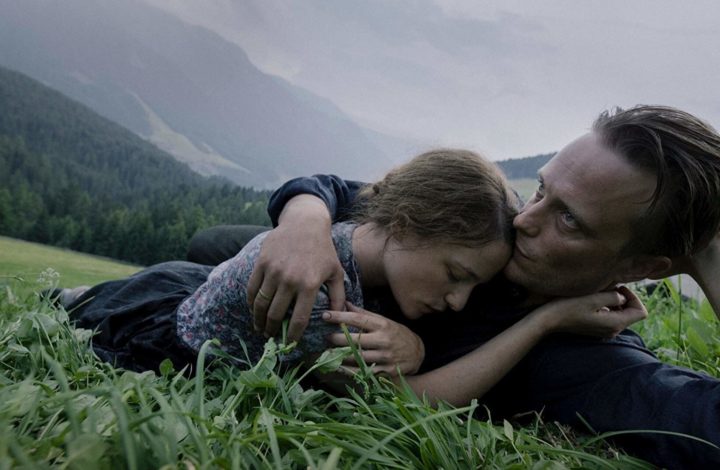
MPAA Rating: NR | Rating: ★★★★★
Release year: 2019
Genre: Biography, History, Romance, Spiritual Director: Terrence Malick
A Hidden Life is both the most Christian and the most political of Terrence Malick’s films. At 173 minutes, it’s also the longest, surpassing The Thin Red Line by three minutes. While some may balk at the expansive running time, Malick makes every minute count in this real-life story about Austrian conscientious objector Franz Jägerstätter, portrayed here by August Diehl. The film was originally titled Radegund, the name of the edenic mountain village where Franz and his beloved wife, Fani (Valerie Pachner), reside with their three young daughters. Theirs is a simple, peaceful life of farming, family, and faith. All this is upended by the growing influence of the Third Reich and the onset of WWII. While Franz’s story may not be as well-known as similar Christians who resisted Hitler (namely Dietrich Bonhoeffer), he was declared a martyr and beatified by the Roman Catholic Church after his execution.
A Hidden Life opens with historical black-and-white film footage of Hitler and Nazi rallies, a stark contrast both visually and tonally to the wide, lush landscape shots of the Austrian mountains. In true Malickian form, the cinematography is breathtakingly beautiful, every image soaking with a sense of sacramentality and awe. There are other trademark Malick motifs here, including fields of wheat waving in the wind, prayerful voiceover narration, and improvisatory golden hour sunlit shots of human beings frolicking in God’s good creation. The mise-en-scène is detailed and delightful, especially the Austrian village and surrounding landscape; it feels like we’ve been transported through time into this quiet corner of the world. Yet this is also Malick’s most conventional narrative in recent years, perhaps even since Badlands. For those who are weary of Malick’s recent elliptical and elusive cinematic fare—particularly To the Wonder, Knight of Cups, and Song to Song—A Hidden Life may feel refreshing in its rootedness in historicity and traditional chronological storytelling.
Yet metaphor, montage, and mystery are all still very present in A Hidden Life. The love story of Franz and Fani unfolds with poetic rhythms, beginning with a motorcycle ride through their idyllic country. When Franz is called up into the military, he initially goes, albeit hesitantly. He’s sent home to farm without ever seeing combat, but something deeply troubles him about the Nazis and the war. “Don’t they know evil when they see it?” a villager whispers to Franz, uttering the words he cannot yet say aloud. While community eventually pays lip service to Hitler’s ideologies, Franz cannot utter the words or raise the salute and retain his integrity. When the day finally comes and the bicycle messenger arrives with the fateful summons, Franz simply stands silent with his arms at his sides while fellow Austrians pledge allegiance to Hitler. He ends up imprisoned and put on trial for treason. There are no big speeches, no political fervor or rallying. Instead, Franz does not speak; he is led like a lamb to the slaughter, silent like a sheep before its shearers.
A Hidden Life is just as much Fani’s tale as it is Franz’s. It’s truly a romance, a love story about husband and wife. When Franz returns home after his brief military service, the pair can’t keep their hands and lips off each other. It’s beautiful to see such a committed, healthy marriage on film, one informed by their Christian faith. Both of their faiths are tested when he is imprisoned and she is left at home to care for the farm and children. She is supported by her spirited, single older sister Resie (Maria Simon) and Franz’s widowed mother. They write letters back and forth; the film credits their real-life letters as source material. Fani often wonders in her prayers to God if He is even listening; if she faithfully knocks, will the door be opened? Pachner is exceptionally good in her performance, imbuing Fani with reverence and resolve in both her posture and her prayers. Indeed, Fani is a woman of noble character, and her husband and children rightly call her blessed.
A Hidden Life presents its Christian heritage unashamedly even as it exhorts and critiques the institutional church. The film is biblically rich, infused with scriptural references through Franz and Fani’s prayers, as well as visual symbols and narrative themes. Churches and priests play active roles in the narrative, and God is often directly addressed. For instance, Franz prays a version of Psalm 23 aloud while waiting for his trial in a German prison; as the camera hovers through the hallways, the biblical words offer hope in the midst of apparent despair, the Good Shepherd restoring the prisoner’s soul. Yet questions remain. Will the darkness of evil be overcome? Will the spirit of the Antichrist—a term mentioned multiple times by different characters—reign in this world? Is God the author of suffering? Or is there salvation in Christ and the possibility of eternal life and light? Can faithfulness to God make a difference in this world?
Read the rest of my review at Fuller Studio here.
IMDB Listing: https://www.imdb.com/title/tt5827916/
While I haven’t seen Song to Song and Voyage of Time (as I want to see both no matter how unconventional they are as I actually enjoyed To the Wonder and Knight of Cups), I am eager to see this learning that it’s Malick’s return to a more traditional and structured-based narrative as I also heard that the film actually says a lot about what is happening right now with the world w/o meaning to and in a silent way.